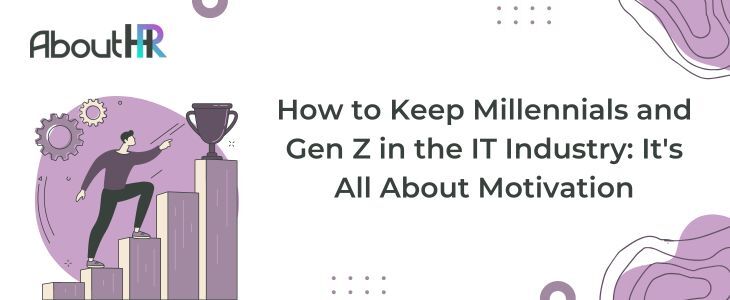You know the stereotypes about Millennials and Gen Z—they’re entitled, lazy, and lack loyalty. But if you’re an IT leader, you also know that’s far from the truth. Members of these generations are digital natives, creative, and value meaningful work. The challenge is keeping them engaged so they stick around for the long haul.
If you want to retain top Millennial and Gen Z talent, you need to understand what motivates them. It’s not just about money or job titles. They want to feel like their work matters, to keep learning and developing new skills, and to have flexibility and work-life balance. Tap into these motivations, and you’ll build a team of innovative, dedicated professionals that will drive your company into the future. The perks and promotions will come in time, but first, focus on creating an environment where they can thrive and make a real impact. Do that, and your Millennial and Gen Z all-stars will make your organization their long-term home.
Understanding the Difference Between Millennials and Gen Z
Understanding the key differences between Millennials and Gen Z is crucial to keeping them motivated and engaged in the IT industry.
- Millennials, born between 1981 and 1996, grew up with technology and are generally optimistic, entrepreneurial, and value work-life balance. They’re motivated by meaningful work, flexibility, and the ability to make an impact.
- Gen Z, born after 1996, are “digital natives” who have never known life without the Internet. They tend to be pragmatic, independent, and entrepreneurial. Gen Z values stability, mentorship, and continuous learning. They want work that fits their skills and interests.
What Motivates Millennials and Gen Z in the Workplace
To keep Millennials and Gen Z in the IT field, you need to understand what motivates them in the workplace.
- Purpose and meaning. These generations want to feel like their work has purpose and meaning. They care about the impact and want to contribute to something bigger than themselves. Show them how their role contributes to the overall mission and goals of the company.
- Flexibility and work-life balance. Millennials and Gen Z value flexibility, work-life balance, and paid time off. Offer flexible work schedules, the option to work remotely, generous PTO and vacation policies. They want to be able to work hard and play hard.
- Growth and development. Continuous learning and career growth are very important to Millennials and Gen Z. Provide opportunities for mentorship, ongoing education, and skills development. Offer clear career paths and opportunities for advancement. They want to keep improving and reaching for the next challenge.
- Feedback and recognition. These generations thrive on regular feedback and recognition for their work. Give constructive feedback, praise their wins, and recognize their contributions. Say “thank you” and give credit where it’s due. They want to know their work is valued and appreciated.
- Compensation. While not the only motivator, fair compensation, benefits, and perks are still important for retention. Offer competitive pay, good benefits, retirement plans, and attractive perks. Things like student loan repayment, gym memberships, and free meals or snacks can go a long way.
Keeping Millennials and Gen Z motivated and engaged at work is key to retaining them in the IT industry. Focus on purpose, flexibility, growth, feedback, and compensation. Meet their needs, and they’ll stick around for the long haul.
Offering Flexibility and Work-Life Balance
To keep Millennials and Gen Z in tech jobs, companies need to offer the flexibility and work-life balance these generations crave.
Flexible Work Options
- Millennials and Gen Z value freedom and flexibility. Offer options like flextime, job sharing, compressed workweeks, and telecommuting. Let employees choose schedules that fit their needs.
- Provide generous paid time off and encourage employees to actually use it. Millennials and Gen Z want time for travel, hobbies, and recharging.
- Consider offering sabbaticals for long-term employees. This shows you value their longevity and wellbeing.
Strong Work-Life Boundaries
- Millennials and Gen Z believe that work is not the center of life. Respect employees’ personal lives by not expecting constant availability or long work hours.
- Avoid contacting employees after work hours or on weekends unless absolutely necessary. Make it clear that time off is truly time off.
- Provide resources for employees to unplug like phone-free meeting rooms, meditation spaces, and subsidized gym memberships.
Mentorship and Growth Opportunities
- Offer mentorship programs to help younger employees learn skills and advance their careers. Millennials and Gen Z crave guidance and professional development.
- Provide opportunities for lateral moves, promotions, and career growth. High-potential employees want new challenges and paths for progress.
- Offer generous education benefits like tuition reimbursement. Many Millennials and Gen Z value continuous learning and skill building.
Giving Millennials and Gen Z flexibility, work-life balance, mentorship, and growth opportunities will make them feel valued and motivated to stay in tech roles long-term. When companies support what matters most to these generations, they gain loyal, dedicated employees.
Key Strategies for Long-Term Motivation and Retention
So there you have it. If you want to keep your Millennial and Gen Z IT talent motivated and sticking around for the long haul, focus on the things that really matter to them. Give them meaningful work that makes a difference. Provide coaching and mentorship to help them grow their skills and advance their careers. Offer flexible work options so they can maintain a healthy work-life balance. And make sure to recognize their contributions and show you value them. Do these things, and your youngest employees will be motivated to keep innovating and pushing your tech team and company into the future. The future of IT depends on the next generation, so do what it takes to keep them inspired and invested in your organization’s success.


